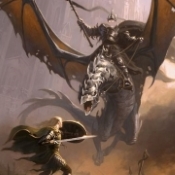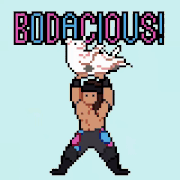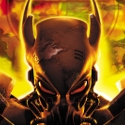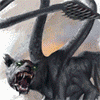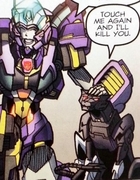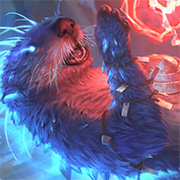|
Splicer posted:So when my god shot that guy with lightning up close he did it all controlled like, but when my god shot that guy with lightning from far away, well, it's tricky you know? I think it's more that bullets and arrows can't show mercy. We can disagree and say we should be pinning people's clothing to trees and random objects with arrows like in half the film versions of Robin Hood, but that's were 5E decided to draw the line. I think spells are out anyway, it has to be a melee attack. I've seen a few systems that have the ability to reduce damage is fairly well integrated. The new edition of Fading Suns has one fencing style where the special move is a social attack after you reduce the damage of your sword attack to zero, allowing you to gain advantage or end the fight through intimidation. Sword and Scoundrel has a mechanic where reducing the damage of an attack has the same cost as increasing it by that amount, making it fairly straightforward to strike to wound or intimidate.
|
|
|
|

|
| # ? May 26, 2024 23:58 |
|
Toshimo posted:In 5e, you can do this with any melee attack, natively. Just declare it. Ranged/spells are lethal, though, because it's narratively much harder to justify (you may or may not agree). Obviously I have huge biases against 5E for a number of reasons but man this really just does seem like a completely arbitrary distinction to make for no real benefit I can fathom, except maybe to appeal to people who want to "well ACTUALLY" over the lethality of fireballs. You made it halfway there by going "you can knock someone out with a battleaxe" or whatever and that works fine, why not just go all the way?
|
|
|
|
Servetus posted:I think it's more that bullets and arrows can't show mercy. We can disagree and say we should be pinning people's clothing to trees and random objects with arrows like in half the film versions of Robin Hood, but that's were 5E decided to draw the line. I think spells are out anyway, it has to be a melee attack. Sounds like Crawford needs to watch Arrow.
|
|
|
|
Servetus posted:I think it's more that bullets and arrows can't show mercy. We can disagree and say we should be pinning people's clothing to trees and random objects with arrows like in half the film versions of Robin Hood, but that's were 5E decided to draw the line. I think spells are out anyway, it has to be a melee attack. I mean HP already aren't meat points. If we worked with a larger systemic assumption that not everyone fights until incapacitation (a totally warranted assumption), then it's quite easy to say that the situation gets bad enough for the enemies to retreat or whatever if their HP goes to 0. Plenty of people got in pre-modern combats, even those with lots of missiles involved, and walked away, especially with armor involved. But of course, D&D in particular seems highly resistant to the idea that player desires can have any impact at all on anything "in world," so somehow instead of just saying "hey you and/or your players might not think killing everyone is okay, here are some perfectly reasonable alternatives," we get things like "well you can avoid killing people, but it has to be realistic that your character could." Which, leaving aside that RPG designers are generally not scholars and have a terrible idea of what is or isn't realistic, is just putting the cart before the horse. If the players are trying to capture an enemy for game related reasons, assess it as a game action, sure. But if players want to avoid killing enemies because of their comfort level or the idea of what's heroic, it doesn't need to necessarily reflect a choice their characters are making, and the rules should just direct you to have a discussion with the players about it, so everyone understands that "they retreat" is code for "they are done for this encounter" and not "follow up and kill them or there will be consequences," and so forth.
|
|
|
|
There are a lot of systems that have built up over time to create the lethal paradigm of 5E. -Take opportunity attacks; trying to escape an enemy gives them extra attacks on you, making fleeing combat more dangerous than staying put. So opponents fight to the death instead of running. -If you don't act on your turn you lose it, and while staying your hand to allow a foe the chance to fall back or surrender could be flavored with "dodge" and staying defensive it certainly isn't highlighted as such. There is rarely any benefit to waiting or choosing not to act so people attack or cast spells every round. -Lack of understanding on the part of writers that hit points were never meant to represent blood or flesh leads to it's own problems. -Arguments about "realism" or "verisimilitude" restrict who can choose to be merciful and lock out the spellcasters who can be a major source of damage.
|
|
|
|
This is why Iíve come to love morale rules. The minute someone actually gets killed in your combat should be a point where everyone involved reevaluates the situation.
|
|
|
|
Liquid Communism posted:I think a lot of that is the result of games like D&D owning most of the mindshare. Yeah, I've tweaked a bunch of stuff for homebrew rules and systems before and ran into this issue a bunch, and I feel pretty confident saying that this is a core problem of how "hit points" work in systems like these. In pretty much every mainstream TRPG you can stab and bash at someone until they only have a single point of HP left, and they're still just as capable of murdering you as they were before the fight started. Kick them in the shins hard enough to deal just 1 more point of damage, and they immediately keel over and start bleeding to death in a matter of rounds. People always mention the old "hit points represent luck" thing, where every hit against a target is merely superficial until the last point of damage is a fatal blow, but that only serves as a justification for the way the HP model works rather than addressing any of the actual problems the model causes in gameplay. I've seen board games (not even TRPGs, just board games) where every point of 'damage' came with some sort of negative condition that represented a wound that stacked a penalty onto the character, like stinging bruises, bleeding lacerations, or even broken bones. Doing things that way would certainly be more complicated, and also have sort of a snowballing "winners start winning harder" effect, but you wouldn't feel as compelled to slay a bandit if you already had him limping away with a broken arm or whatever, he's already pretty much done. It would also make the silly dog-piling "always focus down one target at a time" thing less optimal, as spreading out the damage spreads out a bunch of debuffs too.
|
|
|
|
Liquid Communism posted:I think a lot of that is the result of games like D&D owning most of the mindshare. There's also the 40+ year history of lovely DM advice saying that if any enemies run, they'll automatically go get more enemies, steal all the treasure, set a bunch of ambushes, and so on.
|
|
|
|
DalaranJ posted:Thatís strange because BitD is supposed to have significant mechanical and narrative penalties for killing people. Paraphrasing and condensing here, but "When you kill someone, heat goes up. And the bluecoats and spirit wardens come after you. And you create angry ghosts. And whatever conflict you were having escalates to deadly. And nobody wants to do any kind of negotiating with you because you just stab as a first resort. To solve these problems you should... "Uh... find a way to make heat go down?" Because theironjef posted:There's also the 40+ year history of lovely DM advice saying that if any enemies run, they'll automatically go get more enemies, steal all the treasure, set a bunch of ambushes, and so on. Elector_Nerdlingen fucked around with this message at 03:41 on Mar 25, 2021 |
|
|
|
DalaranJ posted:That’s strange because BitD is supposed to have significant mechanical and narrative penalties for killing people. It has a lot of mechanics that don't come through very well unless you already know what you're doing before you even read the book. Have to revisit that game sometime...
|
|
|
|
SkyeAuroline posted:It has a lot of mechanics that don't come through very well unless you already know what you're doing before you even read the book. I'm not going to lie. I totally hosed up my BitD campaign due to not understanding it first
|
|
|
|
Vanguard Warden posted:Yeah, I've tweaked a bunch of stuff for homebrew rules and systems before and ran into this issue a bunch, and I feel pretty confident saying that this is a core problem of how "hit points" work in systems like these. In pretty much every mainstream TRPG you can stab and bash at someone until they only have a single point of HP left, and they're still just as capable of murdering you as they were before the fight started. Kick them in the shins hard enough to deal just 1 more point of damage, and they immediately keel over and start bleeding to death in a matter of rounds. I mean Shadowrun has a truckload of flaws, but their damage system was always great. Seperate physical and stun tracks, penalties from both filling up as they go, and stun overflows into physical. Only way to really kill someone is to hard overflow their physical damage, which is hard to do by accident.
|
|
|
|
semi-regular reminder that Tenra Bansho Zero still has the best damage system ever created in an RPG
|
|
|
|
Lumbermouth posted:This is why Iíve come to love morale rules. The minute someone actually gets killed in your combat should be a point where everyone involved reevaluates the situation. you could even go so far as to have a morale roll as soon as the first person falls unconscious. then a much harsher one for death
|
|
|
|
gradenko_2000 posted:not to overstate the point, but what's kind of going on here is that 3e already assumed that everyone, NPCs included, would still go through the death save process, and you could as a PC inflict subdual damage if you wanted to, just with a penalty Along these lines: I've increasingly found the animosity a lot of 3E players had to 4E baffling the more I've dug into the history of D&D for the simple reason that 3E has a lot more mechanically in common with 4E than it does with, say, 2E. Like, I legitimately think the jump between 2E and 3E was probably the single biggest mechanical shift between editions we've seen to date. Like, it fundamentally changed the core rolling mechanics of a bunch of systems to only use a D20 instead of whatever dice caught the designer's fancy when they came up with the mechanic, Switched over from descending to ascending AC, Changed the fundamental nature of saving throws, added a bunch of new core classes, etc.
|
|
|
|
As stupid as it sounds at the time I remember a lot of rancor coming out of WotC tying 4th ed's marketing into their attempt to make a myspace/facebook knockoff called Gleemax, and to do so nuked their old forum and archives.
Terrible Opinions fucked around with this message at 05:16 on Mar 25, 2021 |
|
|
|
KingKalamari posted:Along these lines: I've increasingly found the animosity a lot of 3E players had to 4E baffling the more I've dug into the history of D&D for the simple reason that 3E has a lot more mechanically in common with 4E than it does with, say, 2E. Like, I legitimately think the jump between 2E and 3E was probably the single biggest mechanical shift between editions we've seen to date. Like, it fundamentally changed the core rolling mechanics of a bunch of systems to only use a D20 instead of whatever dice caught the designer's fancy when they came up with the mechanic, Switched over from descending to ascending AC, Changed the fundamental nature of saving throws, added a bunch of new core classes, etc. At the risk of sending the thread on a weird spiral, I don't think you can try to make sense of the 3E-to-4E edition war from any sort of "logical" perspective, but it makes a lot more sense if you view it was a sort of weird precursor to a lot of stupid culture war poo poo, people staking out a "my side versus their side" perspective and going super ride-or-die on it, and several of the big voices really loudly shouting about how 4E wasn't a real RPG are people who were also ranting about "cultural marxism" and proto cancel culture stuff etc. Does it sound really dumb to get that way over D&D? It is, yeah. No, I don't think not liking 4E means you must inevitably be that sort of person, before anyone tries to make that leap, all I'm saying is that the overall tone of the edition war is extremely reminiscent of the same stuff you see now whenever anybody brings up stuff like "man it's a little messed up that D&D makes some races just Always Biologically Evil huh" in terms of people ready to die on the hill of gatekeeping True D&D from those trying to usurp it. The other big difference going on is just that the 4E edition war happened in a context where all that stuff had a lot more permanence. When 3E came out there was a lot of the same complaining going on, but it all happened on usenet and out of the way forums so it eventually just fell into the memory hole, and nobody was making or continuing to support AD&D2E stuff anymore, while the next edition war happened with everyone blogging about it and posting poo poo on social media about it and also there was basically a 3E sequel game picking right up where the actual 3E left off so adherents of the old edition never had to contend with gradually shrinking off.
|
|
|
|
Kai Tave posted:At the risk of sending the thread on a weird spiral, I don't think you can try to make sense of the 3E-to-4E edition war from any sort of "logical" perspective, but it makes a lot more sense if you view it was a sort of weird precursor to a lot of stupid culture war poo poo, people staking out a "my side versus their side" perspective and going super ride-or-die on it, and several of the big voices really loudly shouting about how 4E wasn't a real RPG are people who were also ranting about "cultural marxism" and proto cancel culture stuff etc. Does it sound really dumb to get that way over D&D? It is, yeah. No, I don't think not liking 4E means you must inevitably be that sort of person, before anyone tries to make that leap, all I'm saying is that the overall tone of the edition war is extremely reminiscent of the same stuff you see now whenever anybody brings up stuff like "man it's a little messed up that D&D makes some races just Always Biologically Evil huh" in terms of people ready to die on the hill of gatekeeping True D&D from those trying to usurp it. I think most of this is true but one thing that gets lost, particularly on this forum, looking at 3e is that 3e attempted to be the really broad "do all the D&D mechanics/game ideas" game that 2e had become. All the random poo poo that seems to have no purpose in 3e's rulebooks now was based off of existing mechanics and systems in 2e, and 4e pared a lot of that back. WAY back. So 4e felt significantly worse and got into a lot of controversy because it was less than 3e in scope, because it made the design choice to be more focused and do what it wanted to do very well instead.
|
|
|
|
Arivia posted:I think most of this is true but one thing that gets lost, particularly on this forum, looking at 3e is that 3e attempted to be the really broad "do all the D&D mechanics/game ideas" game that 2e had become. All the random poo poo that seems to have no purpose in 3e's rulebooks now was based off of existing mechanics and systems in 2e, and 4e pared a lot of that back. WAY back. I won't disagree with this in a broad sense, 4E was a "step back" from 3E's attempt to be simultaneously a broad, all-encompassing sort of thing and also D&D at the same time. The one thing I'll say that was uniquely 3E at the time and not just a legacy thing was its attempt to "universalize" the game on both sides of the screen, that is now NPCs and monsters and etc were built on the same rules that players were, feats, lists of spells, all that stuff. That one I think is maybe the biggest overall change that 3E made when prior editions of D&D just had monster stats based on a more streamlined "only what you really need" sort of framework, and yeah 4E absolutely moved back from that for a number of reasons (which ultimately weren't relevant to the edition war because people had already decided which one was Real True D&D and which one wasn't).
|
|
|
|
KingKalamari posted:Along these lines: I've increasingly found the animosity a lot of 3E players had to 4E baffling the more I've dug into the history of D&D for the simple reason that 3E has a lot more mechanically in common with 4E than it does with, say, 2E. Like, I legitimately think the jump between 2E and 3E was probably the single biggest mechanical shift between editions we've seen to date. Like, it fundamentally changed the core rolling mechanics of a bunch of systems to only use a D20 instead of whatever dice caught the designer's fancy when they came up with the mechanic, Switched over from descending to ascending AC, Changed the fundamental nature of saving throws, added a bunch of new core classes, etc. 1) Pretty much every version of D&D encounters resistance, there are still TSR holdouts to this day. Finding fellow grognards became easier in the age of social media. A bunch of circular narratives about 4E being "video gamey" and "restrictive" that fall apart under light scrutiny were widely circulated, but social media doesn't really promote discussion, it promotes majority rule. 2) At some point a bunch of people decided that 3E was the "perfect" system that you could do "anything" with, spurred on by an enormous number of splatbooks and a huge variety of third-party products, as well as how easy it is to hack, since the core game isn't balanced to begin with. If you can make a table in Word you can make a 3E class progression. 3) Paizo weaponized the discontent to market Pathfinder. In this sense 4E became a victim of WotC's open-handed approach with the previous game. 4) Once Mike Mearls was in charge, the fix was basically in, as he never liked the game in the first place and didn't understand it.
|
|
|
|
Kai Tave posted:At the risk of sending the thread on a weird spiral, I don't think you can try to make sense of the 3E-to-4E edition war from any sort of "logical" perspective, but it makes a lot more sense if you view it was a sort of weird precursor to a lot of stupid culture war poo poo, people staking out a "my side versus their side" perspective and going super ride-or-die on it, and several of the big voices really loudly shouting about how 4E wasn't a real RPG are people who were also ranting about "cultural marxism" and proto cancel culture stuff etc. Does it sound really dumb to get that way over D&D? It is, yeah. No, I don't think not liking 4E means you must inevitably be that sort of person, before anyone tries to make that leap, all I'm saying is that the overall tone of the edition war is extremely reminiscent of the same stuff you see now whenever anybody brings up stuff like "man it's a little messed up that D&D makes some races just Always Biologically Evil huh" in terms of people ready to die on the hill of gatekeeping True D&D from those trying to usurp it. It was not a precursor to anything. People having online holy wars over trivial poo poo goes back to the 1980s USENET and the modern right wing beating the culture war drum goes back to the 1992 election, a full 16 years prior to 4E's publication.
|
|
|
|
Kai Tave posted:I won't disagree with this in a broad sense, 4E was a "step back" from 3E's attempt to be simultaneously a broad, all-encompassing sort of thing and also D&D at the same time. The one thing I'll say that was uniquely 3E at the time and not just a legacy thing was its attempt to "universalize" the game on both sides of the screen, that is now NPCs and monsters and etc were built on the same rules that players were, feats, lists of spells, all that stuff. That one I think is maybe the biggest overall change that 3E made when prior editions of D&D just had monster stats based on a more streamlined "only what you really need" sort of framework, and yeah 4E absolutely moved back from that for a number of reasons (which ultimately weren't relevant to the edition war because people had already decided which one was Real True D&D and which one wasn't). I think you're missing the point though - it's not that 3e was trying to be a "broad all-encompassing sort of thing," but that that "broad all-encompassing sort of thing" was already D&D by the time 3e came out. (You can argue whether broadening D&D was a good idea or not, but 2e did it in spades with endless settings and sourcebooks about literally everything under the sun.) So 3e wasn't adding in a bunch of extra stuff to get away from the classic idea of what D&D should be, that extra stuff was already there and 3e was updating it and unifying it (what you call the effort to "universalize" it). So 4e turning away from that broad all-encompassing idea OF D&D was a direct repudiation of a lot of ways people were already playing the game in a way 3e hadn't pushed away previous players, and that was one of the components that made the edition war considerably worse between 3e and 4e.
|
|
|
|
Paolomania posted:It was not a precursor to anything. People having online holy wars over trivial poo poo goes back to the 1980s USENET and the modern right wing beating the culture war drum goes back to the 1992 election, a full 16 years prior to 4E's publication. Yeah I know, I'm talking about the particular Extremely Online version that exists now, look I'm not trying to claim that what happened with the 4E edition war was a unique aberration never before seen in history, only that if you try to approach it from a perspective of "but the actual game itself" or "but the rules do/don't say" that you're not going to find any answers there.
|
|
|
|
KingKalamari posted:Along these lines: I've increasingly found the animosity a lot of 3E players had to 4E baffling the more I've dug into the history of D&D for the simple reason that 3E has a lot more mechanically in common with 4E than it does with, say, 2E. Like, I legitimately think the jump between 2E and 3E was probably the single biggest mechanical shift between editions we've seen to date. Like, it fundamentally changed the core rolling mechanics of a bunch of systems to only use a D20 instead of whatever dice caught the designer's fancy when they came up with the mechanic, Switched over from descending to ascending AC, Changed the fundamental nature of saving throws, added a bunch of new core classes, etc.
|
|
|
|
KingKalamari posted:Along these lines: I've increasingly found the animosity a lot of 3E players had to 4E baffling the more I've dug into the history of D&D for the simple reason that 3E has a lot more mechanically in common with 4E than it does with, say, 2E. Like, I legitimately think the jump between 2E and 3E was probably the single biggest mechanical shift between editions we've seen to date. Like, it fundamentally changed the core rolling mechanics of a bunch of systems to only use a D20 instead of whatever dice caught the designer's fancy when they came up with the mechanic, Switched over from descending to ascending AC, Changed the fundamental nature of saving throws, added a bunch of new core classes, etc. yeah that's basically what I've been writing about for drat near a decade now - if you actually looked at 4e's design, you'll find that at almost every turn, it was the product of the developers looking at 3e and saying "okay, we have an existing system - how do we make it better?": * cone-shaped spells in 3e sucked because it's hard to count-out the shape of an expanding cone against a square grid, so let's just create the idea of a Blast where it's a flat square shape that just extends straight out from the caster * circular-shaped spells in 3e sucked because, again, it's hard to count-out the shape of what's supposed to be a circle against a square grid, so let's just create the idea of Burst where it's again just a flat square shape radiating out from the caster * sure, it's "realistic" for a martial class to be able to Improved Trip all the time, but since they can do it all the time, then the power level of an always-readily-available ability has to be necessarily limited. We should create a category of abilities that are more gated in how often they can be used so that we have a larger breadth of ability types to play around with. Actually, we already experimented with that in Tome of Battle, but since you could recharge TOB maneuvers within the same encounter, even that still had to be reined in a bit. If we strictly enforce a once-per-encounter limit, that creates a bigger design space. * and the other design space we need to give other classes is "daily" abilities, given that that's already what casters have to play with * there's no real reason for us to invert the die-rolling mechanism of an attack roll versus AC, versus defensively rolling a saving throw versus a spell DC, so let's just turn saving throws into Defenses and make it consistent across the board * the "full-round attack" idea penalizes movement and hurts Opportunity Attacks, so it's better if we let players deal what is effectively their full damage potential all the time so that they can always use it in conjunction with their movement... but also, making full-round attacks consist of multiple attack rolls slows down combat, so let's just say that at higher tiers, they still only attack once, but the damage is increased as if they hit twice or thrice and so on and so on and so on ___ and the other, even less well-known corollary to this, is that if you looked at AD&D 2e's Combat & Tactics, that's where you'll find a LOT of where 3e's combat rules came from, such that while there WAS a large shift once 3e moved to a unified d20 mechanic, you can also see a clear through-line from 2e to 3e, the same way that there's a clear through-line from 3e to 4e
|
|
|
|
Ultiville posted:I mean there's an extent to which that's true, but it's also in some ways orthogonal. That would also be a worthwhile thread to have, and I'm down for continuing this conversation in another thread if you like, although I suspect we'd just end up talking past each other at a certain point since we're not likely to convince each other of anything. I don't find it morally untenable to pretend that there is a world where Real Objective Evil is compatible with personhood, and where that threat can be combatted with violence without it being a moral quandary. That is definitely a minority opinion here, and I'd rather not continue the derail any further in the industry thread, but if someone wants to carry it on elsewhere I'm down.
|
|
|
|
FMguru posted:The people who got hugely bent out of shape over the 3E -> 4E transition as a sharp break from the seamless evolution of OD&D -> 1E -> 2E -> 3E almost all got their start with 3E and never played 1E/2E. This I fell mostly out of RPGs and almost completely out of D&D (and into a bunch of improv/larp type poo poo) for maybe 7 or 8 years in the 2000s, and because of that I never really got into 3rd ed. So I wasn't really paying attention in 2008-2009 and for a fairly long time I thought the complaint about 4th ed was "it's updated 3rd ed instead of being a regression to 1/2". It never crossed my mind that people were thinking of 3.x as a natural incremental progression from 2nd ed. Elector_Nerdlingen fucked around with this message at 07:01 on Mar 25, 2021 |
|
|
|
Deleted because other people already said it. (About 5e and 0 hp)
Angrymog fucked around with this message at 07:17 on Mar 25, 2021 |
|
|
|
Liquid Communism posted:I tend to make it a thing in any system I'm running that if you want to kill someone, you need to specifically say so. When I've run Supers that's the default even if that's not how the system is written.
|
|
|
|
Sodomy Hussein posted:1) Pretty much every version of D&D encounters resistance, there are still TSR holdouts to this day. Finding fellow grognards became easier in the age of social media. A bunch of circular narratives about 4E being "video gamey" and "restrictive" that fall apart under light scrutiny were widely circulated, but social media doesn't really promote discussion, it promotes majority rule. FMguru posted:The people who got hugely bent out of shape over the 3E -> 4E transition as a sharp break from the seamless evolution of OD&D -> 1E -> 2E -> 3E almost all got their start with 3E and never played 1E/2E.
|
|
|
Splicer posted:And I remember my group (playing together since BECMI) at the time when 3E came out, we got the books and started poring through them; the very first feedback from my DM was "So, how do we get rid of attacks of opportunity? Also, where the gently caress is THAC0?" . I was more open to the changes, but I must admit it felt so weird, after having spent a decade+ learning the "backwards math" of 2E and earlier, to have consistent calculations. By the time 4e came out I was living in a different country and lost contact, but I would have been curious to know how my DM would have reacted to that edition. But yeah, no internet or rather, very little resembling social media/mass forums meant most complaints were within tiny bubbles.
|
|
|
|
|
Sodomy Hussein posted:3) Paizo weaponized the discontent to market Pathfinder. In this sense 4E became a victim of WotC's open-handed approach with the previous game. And now I hear Pathfinder 2E has grabbed at 4E with both hands for the system improvements?
|
|
|
|
Dawgstar posted:And now I hear Pathfinder 2E has grabbed at 4E with both hands for the system improvements? Not really, no. PF2e is just super complicated. I don't really understand the comparison at all.
|
|
|
|
PF2e has stolen a lot of little things from 4e, but yes it's hilariously complicated now. If you thought 3.5 and 4e had feat bloat you've seen nothing yet. Every level in PF you're picking up at least one feat. Be it Class, Ancestry, or general.
|
|
|
|
Sampatrick posted:Not really, no. PF2e is just super complicated. I don't really understand the comparison at all. I think the easiest comparisons are: They both assume you'll full heal between encounters and make it easy to do so, players and monsters apply lots of conditions that you have to track, significantly tighter balance between martials and casters with a lot of toning down of spells, well balanced encounter design system, "long" combats. I ran 4e in VTTs with a ton of automation and I do the same for PF2E and combat's pretty fast if everything happens automatically with some clicking. I remember 4e taking longer, but I also haven't played PF2E at higher levels yet like I did with 4e. PF2E definitely lacks the HP sponge bosses that 4e had, so I think it'll always be a bit more rocket tag than 4e. There're a ton of differences of course, and I think you can point at the systems in PF1E they were trying to fix more easily than the system in 4e they were trying to borrow. The healing is because everyone in PF1E just bought CLW wands and healed to full between encounters anyway, the encounter balance is just a thing you'd naturally want in a combat focused TTRPG, the balance between casters/martials is also something you'd want so people don't feel punished for not writing down wizard or whatever. They also worked pretty hard on having rules with clear keywords and consistent definitions so there's less fuzziness about the rules and it's easier to expand on, since they know in advance they'll be continuously releasing new content for years since it's their business model. Having a bunch of conditions lets you be more granular and easily create new things by mixing/matching different keywords.
|
|
|
|
They also stole 4e's multiclass system. Where you only ever pick one class and can pick up class features and tags from other classes by using your feats on them. The latest player book also introduced "prestige classes" that use the same basic framework. Also powerful race templates that would have had a level adjustment are treated the same way. You can be an aasimar dwarf but that doesn't do anything for you until you pick up the heritage feat at X level.
|
|
|
|
Kurieg posted:If you thought 3.5 and 4e had feat bloat you've seen nothing yet. Every level in PF you're picking up at least one feat. Be it Class, Ancestry, or general. this is more because they decided to call everything as "feats". a "class feat" is more akin to a 4e (class) power, while an ancestry feat or general feat is more akin to a racial power or skill power, and then 4e also had "feats" as a different class of things that provided completely passive effects
|
|
|
|
Sampatrick posted:Not really, no. PF2e is just super complicated. I don't really understand the comparison at all. e: deleted where I got lost in the weeds a bit e2: added it back in because I think Skymall was referencing it "and attaching them in pairs of singles or triples of pairs is also an option (and indeed recommended!) or just use them as decoration or even swap them out for a single ski" but it was tangential to my point. Splicer fucked around with this message at 15:34 on Mar 25, 2021 |
|
|
|
DoctorWhat posted:I worked at an afterschool program/summer camp for over three years where I GMed for children. .. Froghammer posted:I used to occasionally guest DM for D&D nights at a board game bar in Philadelphia. ... Longer-form I'm not sure I'd be comfortable with. I've gotten offers before, but it's a little too close to "paying someone to be your friend" for my comfort. The work I do on the campaigns I run is a labor of love, and making the transition of "labor of love" to "labor" sounds awful. Dexo posted:I've payed for two different games. Thanks! I am considering giving it a go myself because, a) if I want to GM anything right now, finding some Internet randos is already my only option, so might as well get a buck out of it b) I could use the cash at the moment and c) I live somewhere where I could actually probably pay my bills by GMing two-three games a week. Well, we'll see if I manage to do it.
|
|
|
|

|
| # ? May 26, 2024 23:58 |
|
Do people actually enjoy systems where you level up and like..roll a hit die and adjust your math? Picking things is fun. Customizing your character is fun. Most of the complaints I see about feats in PF2E are centered on the fact that general/skill feats feel completely worthless, or you're picking feats to regain abilities that were baseline in PF1E. Or they've explicitly made a feat to give you an ability that people assumed was baseline (like hitting something when you jump.) But also you get a ton of them, so once you shift your mindset over to just some occasional utility and not a defining feature of my character it's mostly fine. It mainly suffers from the competing design goals of "make every level interesting" and "gotta have 20 levels because that's how many levels there are." Also they decided not to give you all the super cool abilities until level 15, so you need 14 levels worth of feats that are on the power level of "You can hit something when you jump 5* feet into the air." (Pre-req feat to jump 5 feet instead of 3.)
|
|
|






